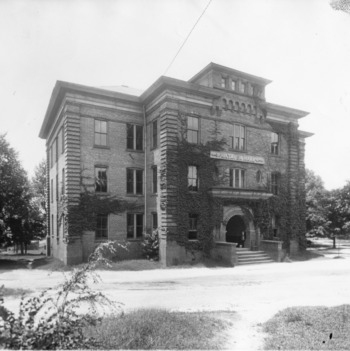Gary D. Hill Scholarship

Each spring, the Department of Sociology and Anthropology selects one undergraduate student to award the Gary D. Hill Scholarship. The merit-based scholarship was created in honor of Gary D. Hill, a beloved faculty member who passed away in 1996 at the young age of 44. The award is given to the student with the strongest combination of GPA and rigorous coursework.
The 2014 award recipient was Sarah Strozeski, a senior in criminology minoring in French and social work. Sarah hails from Rockford, Michigan and has been living in Raleigh since she began her undergraduate career three years ago. Now a senior, Sarah has been initiated into Phi Kappa Phi, the nation’s oldest and most selective collegiate honor society for all academic disciplines. She is a member of the National Residence Hall Honorary (NRHH ), an on-campus organization that recognizes the top 1% of campus leaders. Sarah is also in both the University Scholars Program and the Sociology and Anthropology Departmental Honors Program. She has conducted research under Professors Aldige, Tittle, and De Coster on subjects such as the healthcare system in prison, control balance theory applied to crimes related to alcohol, and strain theory and the gendered perspectives of two books from an inner-city neighborhood. Her final independent research project returns to strain theory, comparing alcohol and drug consumption as a source of escaping strain versus general delinquency as a source of relieving strain over the long term to see which is more effective. She currently has an internship with the Juvenile Court Counselor’s office in downtown Raleigh, and believes that studying crime, especially juvenile crime, is an important undertaking.
“Crime is something that affects everyone,” she says. “We watch the news. We’re touched by it. I don’t think we’re going to ever live in a crime-less world but if there are things that we can do to prevent crime, those should definitely be explored or studied. If we can make an impact on a few peoples’ lives and help put them back on the right path, especially when they’re young and and more moldable, we should.”
Sarah will graduate this Spring and has begun what she calls “the long and arduous process” of applying for the Peace Corps. When she returns from 27 months abroad, she knows that she wants to be engaged in helping people and is considering a Master’s in Social Work, working at a halfway house or re-entry program for those coming out of the prison system, or working for an organization that engages at-risk youth. Sarah says that she isn’t married to one idea about her future after graduation and credits the Gary D. Hill Scholarship for relieving her of some of the pressure that comes during an undergraduate’s final year. She says, “Knowing that I’m not coming out of school drowning with student debt has taken some of the stress off graduating.”
Her advice to her undergraduate peers is simple: “Academic success came in finding something that I really liked doing. Because this school is primarily engineering, it almost becomes a battle of the smarts. But if you judge a fish based on how well it climbs a tree, it’s always going to think it’s stupid. So, you have to find a home and for me that home was in Sociology. Aside from that, as simple as it sounds, actually do the work. Your teachers don’t set you up to do poorly. They give you the resources to do well.”

Sarah would have found an advocate and resource in Professor Gary D. Hill, especially given their shared interest in the causes and origins of criminal activity in specific populations. Dr. Hill was 44 years old at the time of his sudden death from a brain aneurysm in 1996, long before Sarah formed a scholarly identity. He died in his home and is survived by his wife, Mary, and two sons, Andrew and Jackson. Before serving as an associate professor at North Carolina State University from 1982 until his death thirteen years later, he received his bachelor’s degree from Florida State University in 1974 and earned his master’s and doctorate in sociology in 1980 from the University of Massachusetts. Professor Hill’s scholarly interests were in social psychology, criminal etiology and social control. His research made links between structural forces, especially gender, race and class, and individual-level process. His research on female criminality came at a time when a lot of the feminist criminology studies were being done by women. According to Professor Patty McCall, one of Gary’s colleagues and close friends, he felt strongly about the place of women in society, which Professor McCall views as an indication of his highly-developed sense of justice. One of his last publications as first author focuses on women, race, and crime (Women, Race, and Crime).
Gary was also an accomplished teacher, having received two University Outstanding Teaching Awards in 1989 and 1993 and two departmental teaching awards. According to former Dean Toole in 1989’s teaching award letter, “[his] achievements help to set a standard for us all.” Among his peers, Professor Hill ranked number one in student teaching evaluations of all courses in 1993, according to documents from his teaching award package. Among the comments from his fall 1992 students were: “Now I have a whole new image of sociology;” “Professor Hill is fantastic;” “He treated us with respect;” “He truly cared about the students and wanted us to do well;” and, finally, “I think he possesses a special talent of connecting with students in a very human way.”
That sentiment is shared by Professor McCall who says, “Gary was not only bright and insightful, he was a good guy. He cared about other people. He cared about the well-being of the criminology program and the Department. I didn’t realize this until he was gone but so many people saw him as their friend. I knew Gary well enough to know how much time he was spending with these different people and he wasn’t spending much time with them but the quality of that interaction was such that these people saw him as their friend. It was just the way he treated people.”
A colleague of Gary’s, Professor Maxine Atkinson says, “He had a great deal of empathy. When the rest of us would get aggravated or irritated with a student, [Gary] would always say: ‘Well, let’s think about what else might be going on in a student’s life.’ Because how important is one of our classes in the context of a kid’s life? That was one of his favorite phrases: ‘Back off a little bit. Put it in context.’ Whereas most people will focus on what that kid is doing in their class, Gary had quite an understanding and vision of the whole student, rather than just as that kid in your class.”
Beyond research and teaching, Professor Hill served the Department in an important administrative function. When the Department initiated major changes to all aspects of teaching in 1990, Gary accepted the position of Undergraduate Administrator and worked to give ongoing attention to totally restructuring faculty advising and the student teaching evaluation system. The model programs in place in the Department of Sociology and Anthropology today are a tribute to his commitment to teaching and his skill in motivating his faculty colleagues. It was during his time as Undergraduate Administrator that he formed a friendship with Professor Maxine Atkinson, then-Associate Head. Professor Hill and Professor Atkinson arrived at the University two years apart and shared an office where they worked on administrative tasks. She says, “[Gary] was wonderful to work with because he was very skilled at being supportive and not overly critical. And he was always making jokes.”

Both Professor Atkinson and Professor McCall become somber when recalling Gary’s death and each remembers, vividly, where they were when they received word 17 years ago. Professor McCall, indebted to Gary for introducing her to her longtime partner, says that Gary’s death was “a huge loss.” “He cared about enlightening undergraduate and graduate students,” she continues, “and, despite all the other demands on his time, he always made time for his kids.”
Professor Atkinson, whose son was born within twelve days of the birth of Gary’s son, Jackson, says that, probably, the most important role in Gary’s life was being a father. “He had decided that as long as his son’s were young, he was going to focus on fatherhood and on his teaching because he didn’t see how he could do it all and he wasn’t going to miss his children’s childhood. And that’s one of the saddest things about losing him. He did miss most of his children’s childhood.”
At the recommendation of Professor Atkinson, Professor McCall organized contributions of faculty letters to Gary’s sons, who were 14 and 10 at the time of his death. With help, she compiled the letters, made two copies, bound them with hardcovers and gave them to the family.
After his death, CHASS established an endowed memorial fund to honor his achievements and impact at NC State. The mother of Gary’s wife, Mary, contributed the initial funds. You can contribute to the memorial fund through payroll deduction (if employed by the University), or by visiting CHASS Giving. The Gary D. Hill Endowment will not be listed in the drop-down box. You will need to select “I would like to give to a fund not listed here” and type “Gary D. Hill Endowment” in the cell that appears. The fund will be used to support undergraduate scholarships for deserving, hardworking students in Sociology and Anthropology.
Rest in peace, Gary.
- Categories:


